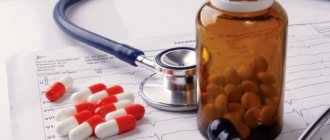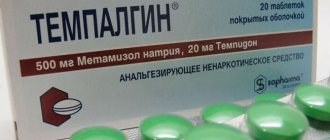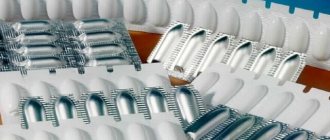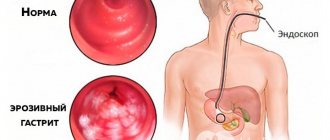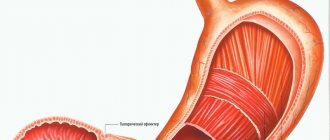The pathogenesis of exacerbation of chronic gastritis is complex; many factors are involved, and treatment is aimed at eliminating them.
Therefore, various medications for exacerbation of gastritis are used in combination, each of them acts on a specific pathological link. What should you do if signs of exacerbation of chronic gastritis appear - what tablets to buy at the pharmacy “for heartburn”, “for pain”, “for nausea”? This should not be done. First, you need to contact a gastroenterologist, undergo an examination, and based on its results, a course of drug therapy will be prescribed. Among a wide range of remedies, the doctor will prescribe the most suitable and effective ones.
How is it developing?
Signs of exacerbation that appear indicate the occurrence of erosions on the walls of the organ. It is the damage to the mucous membrane that causes discomfort. An acute condition can develop within a couple of hours. During this period, the body directs its forces to secrete substances that attract protective cells to the affected area. Their mission is to remove pathogenic substances in the stomach, the activity of which causes an inflammatory process. It follows that exacerbation of gastritis is not only the result of damage to the walls of the organ, but also a reaction to the body’s efforts to recreate the integrity of the mucous membrane.
What should a patient do during an exacerbation?
The answer will be clear: go to the doctor. This disease does not go away on its own, and without specific treatment it can cause serious complications or develop into life-threatening forms.
But quite often a relapse develops rapidly with an increase in pain in just a couple of hours. And a person does not always have the opportunity to immediately consult a doctor to choose the right treatment. This can often happen at night or on holidays. How to relieve terrible pain?
If sharp pain occurs, you can apply a heating pad with cold water to your stomach.
You can take antispasmodics that were previously prescribed by your doctor. No-shpa or Papaverine tablets will help. But the medicine may not be at hand. In this case, folk advice will help cope with the pain syndrome:
- You can lie on your side with your legs pulled up to your stomach. You need to completely relax, which will allow painful spasms to go away in approximately 15 to 30 minutes.
- Use a heating pad with ice water placed in the stomach area.
- Drink valerian or motherwort in the form of a tincture. This remedy helps eliminate disruption of processes associated with nervous regulation, which often provoke relapses of gastrointestinal pathologies.
- Drink chamomile tea - the drink helps relieve inflammation and reduce the burning sensation.
- Suck on a piece of ice to relieve nausea and cramps.
Valerian tincture will help get rid of acute symptoms of gastritis
In case of low acidity, to eliminate nausea, I advise you to dissolve a piece of fresh lemon.
Causes of exacerbation of gastritis
Exacerbation of chronic gastritis most often occurs in spring or autumn, when weather factors affect the body. The contraction of blood vessels leads to spasms, which disrupts the supply of nutrients to the internal organs. In addition, it is known that the stomach reflects the physical and spiritual state of a person.
Endogenous factors
An internal factor that provokes an exacerbation may be chronic diseases of the digestive system or untreated gastritis. Doctors have proven that the bacterium Helicobacter pylori, which perfectly adapts to an acidic environment, can cause vasospasm and the formation of substances that support inflammation.
Other factors
Additional reasons influencing the exacerbation of inflammation are:
- binge eating;
- poorly balanced diet for weight loss;
- craving for alcohol and nicotine;
- increased fatigue;
- stressful situations;
- autoimmune processes in the body.
- poisoning
For a woman’s body, pregnancy becomes a risk group. This does not affect the baby’s development in any way, so chronic gastritis is not a contraindication for pregnancy. It is impossible to determine the exact duration of the acute condition; it depends on immunity, age, and the speed of recovery of the body.
Diseases affecting exacerbations
Considering the close connection between the condition of the stomach and the work of other systems and organs of the body, it is not surprising that other diseases become the impetus for exacerbation. First of all, the presence of an infection in the body can serve as an impetus for a recurrence of stomach inflammation. Such consequences are observed with caries, tonsillitis, sinusitis, periodontitis, and bacterial bronchitis.
Problems with the endocrine system can result in stomach disease. Often, for patients with a history of diabetes mellitus or adrenal disease, the attending physician is forced to select a course of treatment taking into account periodic relapses of gastritis.
Patients with kidney failure also suffer from stomach pain, as nitrogen compounds involuntarily accumulate in their bodies. Any diseases of the digestive organs affect the condition of the stomach. Therefore, with hepatitis, enteritis, colitis, cholecystitis, pancreatitis, relapses of gastritis are not uncommon. Women often encounter this pathology during pregnancy. This is due to changes in hormonal levels and eating habits.
Pathologies of the adrenal glands are one of the causes of exacerbation of gastritis
Important! Leaving an exacerbation of gastritis during pregnancy without treatment is dangerous, since the pathology threatens the fetus with intoxication.
Characteristic symptoms
Heaviness in the abdomen may be a sign of exacerbation of gastritis.
An aggravated inflammatory process manifests itself at the local and general level. Key local symptoms of exacerbation of gastritis are as follows:
- feeling of heaviness in the stomach;
- pain that gets worse after eating;
- burning in the sternum;
- heartburn;
- repulsive odor from the mouth;
- nausea;
- vomit;
- bowel disorder (diarrhea or constipation).
In addition to local symptoms, with exacerbation of gastritis the following appears:
- general weakness;
- irritability;
- elevated temperature;
- dizziness;
- cardiopalmus.
Types of drugs for the treatment of gastritis
By purchasing medications from a pharmacy for exacerbation of gastritis on the advice of friends or neighbors, a person seriously risks his own health. The fact is that even a gastroenterologist finds it difficult to determine the forms of the disease solely by the characteristics of the clinical picture. The symptoms of pathologies with low and high acidity are quite similar, but the drugs used to eliminate them are completely opposite in effect.
Below are the main groups of drugs most often used in the treatment of all types of gastritis:
- gastroprotectors: drugs with single-component and combined compositions are used to regenerate damaged mucous membranes and protect them from aggressive gastric juice;
- dopamine receptor blockers: pills and tablets reduce the severity of symptoms of dyspeptic disorders - nausea, flatulence, vomiting after eating;
- antacids: medications coat the inner wall of the stomach and neutralize excess hydrochloric acid;
Types of drugs for the treatment of gastritis
- adsorbents, enterosorbents: drugs are used to treat gastritis of infectious and toxic etiology to bind harmful compounds and remove them from the body;
- antibiotics: tablets, suspensions, broad-spectrum injection solutions are used to destroy pathogenic microorganisms - the main cause of the inflammatory process in the gastrointestinal tract;
- digestive enzymes. Medications help cure atrophic and hypoacid gastritis, which occurs against the background of impaired breakdown and absorption of proteins, carbohydrates, fats, and biologically active substances;
- antihistamines and histamine receptor blockers: such medications are used to treat gastritis caused by the penetration of allergic agents into the human body or the development of an autoimmune disease;
- gastric antispasmodics: these selective agents exhibit analgesic and antispasmodic activity, relaxing the smooth muscle muscles of the digestive tract;
- proton pump blockers: drugs are used in the treatment of hyperacid gastritis to lower the pH of gastric juice;
- antimicrobial agents: tablets are often included in therapeutic regimens for bacterial diseases to enhance the effect of antibiotics. They help treat superficial, erosive, atrophic, mixed, hypoacid gastritis.
Survey
When initial symptoms appear, a person should definitely consult a specialist. Only a thorough examination can answer the question of why the inflammatory process has worsened. A general diagnosis should be made, and after receiving the results, the doctor can confirm the diagnosis and make individual prescriptions. For the examination, the specialist will prescribe:
- general laboratory tests (urine, blood);
- biochemical tests;
- fibrogastrodudenoscopy, with which you can accurately confirm the presence of a protracted illness and determine increased or decreased acidity;
- histological studies.
Symptoms of chronic gastritis
Chronic gastritis A has no specific symptoms, and the clinical picture of the disease is quite varied. In chronic gastritis with secretory insufficiency, the most common symptoms of the disease are a feeling of fullness, short-term aching pain in the epigastric region , especially during and after meals. Other common symptoms of chronic gastritis are dyspeptic symptoms: nausea, vomiting, heartburn , belching, and unpleasant taste in the mouth. Patients may also experience rumbling in the abdomen, flatulence , and stool disturbances. The epigastric region may be painful on palpation.
If chronic gastritis B occurs with normal or increased secretion of gastric juice, then it is considered superficial and occurs more often in men at a young age. In this case, patients suffer from abdominal pain, sour belching, heartburn, a feeling of heaviness in the stomach after eating, and constipation . The pain may also occur at night.
When the Helicobacter pylori bacterium enters the stomach, it begins to actively multiply, which leads to a change in the normal production of gastric juice, and the appearance of erosion and stomach ulcers .
The general condition of the patient is usually not disturbed, however, with chronic gastritis with insufficient secretion of gastric juice, a decrease in body weight and rapid fatigue may be observed.
Very often, a patient with chronic gastritis experiences symptoms of damage to the liver, intestines, and pancreas, but in this case gastritis is a consequence of these diseases.
First aid for an attack
In case of exacerbation of gastritis, you need to lie on your left side.
The chronic process worsens suddenly and the first actions are aimed at eliminating pain. The best way to do this is to use pain relief pills prescribed by your doctor. But how can you relieve pain if the attack takes you by surprise? If gastritis worsens, you need to lie on your left side and pull your knees to your chest and try to relax. You need to stay in this position for about 30 minutes. Cold applied to your stomach will help speed up the process.
The nervous system plays an important role in the aggravated state of gastritis, therefore, after relieving the pain syndrome, it is necessary to drink valerian or motherwort tincture. It is necessary to calm down and, after stopping the attack, figure out what became the basis for the current condition.
Features of treatment and prevention of exacerbation of chronic gastritis at home
If the form of exacerbation of gastritis is not severe and is not an indication for hospitalization, the doctor prescribes outpatient treatment at home. This does not mean that you can only treat yourself with home remedies. The treatment program prescribed by the gastroenterologist includes diet therapy, medications, and must be strictly followed
As for folk remedies for treating stomach inflammation, there are many of them, officially recognized and recommended by medicine. These include anti-inflammatory herbal infusions (calendula, chamomile, St. John's wort), secretion-stimulating decoctions and infusions (ginger root), enveloping agents (infusion of oats, flaxseed, linden flowers) and many other recipes.
Before using various natural medicines, you need to consult a doctor, then they will be an excellent addition to the main course of treatment. During an exacerbation, you should not use alcohol and vodka tinctures, and in general alcohol in any form, of any strength. Ethanol has a damaging effect on the mucous membrane, and there can be no talk of recovery.
But preventive measures can be ensured at home, following the regimen and recommended diet, exercise and rest regimen, getting rid of bad habits, and drinking alcohol.
Treatment of exacerbation
To treat acute inflammation of the stomach walls, you need to consult a doctor; you should not self-medicate. The use of questionable drugs can lead to complications, and how long the acute phase lasts depends on the strict implementation of the gastroenterologist’s recommendations. The therapy process is complex and includes medication, diet, strengthening the immune defense, and traditional medicine.
Medications
In modern medicine, there are many medications that can restore organ function. The regimen according to which the medication is taken consists of several types: painkillers that remove the source of the problem and eliminate the symptoms. They are effective and each work in their own direction. Let's look at each in more detail.
Pain Remedies
Painkillers are divided into two groups:
- Antacids. Medicines relieve the acidic effect on the inflamed mucosal walls. Magnesium or aluminum included in the composition. have a healing effect. Penetrating into the digestive organ, they envelop the mucous membrane and neutralize excess hydrochloric acid, eliminating vomiting and heartburn. These drugs include: “Rennie”, “Phosphalugel”, “Maalox”, “Almagel”.
- Antispasmodics. Strong medications used for severe pain. No-shpy tablets or injections help relieve pain. They are widely used in hospitals and at home.
Anti-inflammatory
The group includes medications that have a therapeutic effect. For patients with high acidity, the following is prescribed:
- Proton pump inhibitors. The products reduce acidity at the level of microparticles. "Omeprazole", "Omeza", "Pantoprozole";
- Antisecretory agents. There is a decrease in enzymatic adhesion, an increase in mucus synthesis, which has an anti-inflammatory effect. "Ranitidine", "Kvamatel".
In the acute state of chronic gastritis with low acidity, agents are used to increase it, additional enzymes that remove the disorder (constipation, diarrhea) and medications that improve intestinal motility. In some cases, when it comes to the autoimmune nature of the disease, the use of hormones is necessary. This therapy is not suitable for everyone and requires caution in use.
Folk remedies
Horseradish is an excellent helper for acute gastritis.
Herbal medicine can have a positive effect in the acute phase of chronic gastritis. True, like diet, the best results are easily obtained at an early stage of the disease. With daily use, the result is visible after 2 weeks. The following methods are used at home:
- When the acid content is high, it is effective to use multicomponent mixtures consisting of 4-5 components (mint, chamomile, fireweed, bitter wormwood). Take decoctions in a course of 4-5 weeks, 4 times a year.
- When the acid level is low, a decoction of elecampane is widely used, taken 3 times a day before meals.
- An excellent helper for acute gastritis is garden horseradish. It is finely grated and honey is added for taste. You need to take horseradish before meals, no more than 15 grams. To increase the production of gastric juice, you can drink undiluted or diluted horseradish juice.
Drugs and dosage regimens
Below is a more detailed description of the drugs that are used for the medicinal treatment of gastritis in the acute stage.
Analgesics and antispasmodics
Drugs that block pain receptors in the stomach:
- atropine - used in injections 1-2 times a day, or in tablets with an interval of 30 minutes before and 60 minutes after meals;
- bellasthesin, bellalgin, containing belladonna extract - used in tablets before meals;
- gangleron in capsules - taken before meals;
- platiphylline in injection ampoules or tablets, prescribed before meals;
- gastrocepin tablets - taken 30-40 minutes before meals;
- Cimetidine (Histodil) - tablets taken with meals.
Drugs in this group have side effects - they relax smooth muscles and slow down peristalsis, so they are prescribed for a short time only to relieve intense pain.
Antispasmodics:
- no-spa (drotaverine) in injection ampoules and tablets, taken 1 hour after meals;
- halidor in injections or tablets, prescribed as no-shpu;
- metacin in solution for injection and in tablets, which are drunk an hour after meals;
- bendazole (dibazole) in ampoules or tablets, prescribed at intervals of 1 hour before and after meals.
Antispasmodics are prescribed with caution for diseases of the heart and blood vessels (defects, heart failure, hypotension).
Antacid remedies for gastritis
- Almagel – suspension, taken 10-15 minutes before meals;
- Phosphalugel - in addition to the antacid, has an enveloping effect, enveloping substances are taken after meals
- Maalox is a suspension, prescribed like almagel;
- Gastal (Gestal) - tablets, taken 1 hour after eating;
- Rennie - chewable tablets, used to relieve heartburn;
All antacids contain magnesium, calcium, and aluminum salts, and therefore are not used to reduce acidity in persons with kidney failure, brain diseases, children under 12 years of age, and women during pregnancy and breastfeeding. Rennie is not prescribed to patients with diabetes mellitus due to its sucrose content.
Antisecretory drugs
- famotidine - tablets, taken after meals and before bedtime;
- ranitidine - similar to famotidine, but lasts longer, taken in the morning and at night;
- Omeprazole – capsules, taken once a day in the morning.
The action of the first two drugs is based on inhibition of hydrochloric acid production due to silicon and magnesium ions, and omeprazole has a different mechanism of action; it inactivates enzymes involved in the formation of gastric juice. Antisecretory drugs are allowed for children from 2 years of age; they are used with caution for liver and kidney diseases.
Alginates
- Gaviscon - prescribed in the form of a suspension or chewable tablets after meals;
- Laminal – seaweed biogel, taken 2 times a day before meals;
- calcium alginate - obtained from algae, taken three times a day with meals.
Medicines from the alginate group not only relieve heartburn, but also stimulate healing, peristalsis, immunity, and remove toxins, but are not prescribed for iodine intolerance.
Prokinetics
- Zelmac – tablets, prescribed 2 times a day after meals;
- cerukal - used in injections or tablets in the morning and evening before meals; Motilium (domperidone) – tablets, taken before meals 2-3 times a day;
- itomed (itopride) - tablets, prescribed like motilium.
Representatives of the prokinetic group are stimulants of smooth muscles not only of the stomach, therefore they are not prescribed for pregnancy, diarrhea, biliary dyskinesia, and renal pathology.
Antibacterial drugs
Antimicrobial therapy is used when the causative agent of the disease, Helicobacter, is identified. This group includes:
- Metronidazole (Trichopolum) is a broad-spectrum antimicrobial and antiparasitic agent, prescribed in tablets three times a day for a week;
- Clarithromycin is a macrolide antibiotic with an effect on a wide range of bacteria, prescribed 2 times a day for 5-7 days;
- Amoxicillin is an antibiotic of the synthetic penicillin group, take capsules or tablets 4 times a day for 7-8 days.
Antibacterial agents combine well with omeprazole; it enhances their effect. They are not prescribed in the first half of pregnancy, in the presence of allergies, asthma, or renal failure.
Gastroprotectors
There are 2 subgroups of drugs:
- stimulants of mucous gland function: misoprostol in tablets and sodium carbenoxolone (duogastron) in capsules, taken 2-3 times with meals;
- creating protection for the mucous membrane: bismuth nitrate tablets, de-nol, venter 2-3 times a day before meals.
Gastroprotectors are effective for the erosive form of gastritis, promote rapid healing, and are not prescribed during pregnancy, lactation, or children under 12 years of age.
Diet for acute gastritis
Therapeutic procedures and prevention of exacerbation of the disease are impossible without following the main nutritional rules:
- For 3 days after the attack, a strict diet with only liquid food is followed; later pureed foods can be introduced.
- Meals per day must be divided into several times, the number of meals is at least 5 times. The portions are small, the food is warm. The best cooking method is steamed and always pureed. This rule is observed as a prevention of exacerbation.
- Vegetables with coarse fiber should not be included in the diet: radishes, peas, beans, rye, sour berries and fruits.
- When the disease worsens, the menu must contain a moderate amount of proteins, fats and carbohydrates, and an increased amount of vitamins. The menu includes meat and vegetable broths, juices, and tea.
- Fatty meats, salted and smoked foods, coffee, carbonated drinks, and fresh baked goods are prohibited.
- Moderate use of salt should be maintained.
Nutrition during exacerbation
During a relapse, the patient is transferred to a gentle diet, which fully corresponds to diet No. 1. Nutrition should be complete, but include mechanical sparing. Food is consumed boiled, preferably boiled and pureed. The power mode is fractional.
The basis of the diet during an exacerbation is pureed soups and viscous porridges. Doctors recommend cooking semolina, oatmeal and buckwheat porridge. Later you can add rice and millet. All products with coarse fiber are excluded. Chemical sparing involves avoiding foods that enhance secretory function, that is, sour, fatty, spicy foods.
With the right approach to treatment, an exacerbation can be stopped in a couple of weeks. But a full course of treatment and a gentle diet are usually recommended for a period of about a month.
The prevention of gastritis will be discussed in the video:
Possible complications
If we talk about exacerbation, we need to highlight possible complications as a separate item. After all, they can lead to death. Frequent exacerbations of chronic gastritis can lead to dysfunction of the liver, pancreas, and intestines.
The disease can be complicated by the formation of erosions (peptic ulcer), the opening of bleeding, and possible restructuring of the mucous membrane is dangerous due to the transformation of gastritis into a malignant tumor. But if you treat the disease in time, you can prevent complications and completely get rid of gastritis.
Features of the use of gastric drugs
It is impossible to cure gastritis in an adult or child with just one drug, no matter how multicomponent and balanced its composition. In the therapeutic regimen, the gastroenterologist includes drugs that have a complex effect on the human body:
- eliminate the cause of the pathological process;
- reduce the severity of symptoms;
- relieve inflammation;
- prevent the development of complications;
- restore damaged mucous membrane.
During treatment of any form of gastritis, the patient must adhere to a special diet. It not only speeds up recovery, but also promotes complete absorption of drugs. There are many nuances of using medications, which the doctor tells the patient about before starting therapy. For example, at least an hour should pass between taking enterosorbents and taking other medications. Otherwise, Smecta or activated carbon will adsorb beneficial ingredients on their surface and then simply remove them from the body. Improper use significantly reduces the therapeutic activity of drugs and prevents rapid recovery.
Not many people know that gastritis can be infected. The disease develops after the pathogenic bacteria Helicobacter pylori penetrates the stomach. Therefore, before treating any type of gastritis of the stomach, a biological sample is analyzed for the presence of these microbes. If they are detected, antibiotic therapy is mandatory. The drugs used to kill Helicobacter pylori have numerous side effects:
- decreased immunity;
- development of dysbacteriosis;
- manifestation of allergy symptoms.
The treating gastroenterologist will definitely tell you how to avoid the occurrence of these negative conditions. To do this, you need to simultaneously use probiotics while taking antibiotics, but only those that consist of dried cultures of live lactobacilli. The Russian eubiotic Lactobacterin has proven itself to be excellent in the prevention of dysbacteriosis. But Linex, Acipol, Hilak Forte are advisable to use after the end of antibiotic therapy.
Treatment of gastritis Almagel A allows you to simultaneously eliminate pain and reduce the pH of gastric juice
Diagnostic methods
After detecting the first symptoms, it is necessary to undergo a full examination to identify the main causes of the attack and prescribe treatment for chronic gastritis in the acute stage.
Diagnostics implies:
- passing a general, biochemical blood test;
- stool and urine analysis;
- endoscopy;
- histology;
- ultrasonography;
- taking a biopsy.
An endoscopic examination is carried out to possibly detect erosions, scar damage, internal bleeding, and swelling of the stomach. A complete medical examination will allow you to formulate the correct diagnosis and prescribe effective treatment for exacerbation of chronic gastritis.
What it is?
In simple words, chronic gastritis is a chronic disease characterized by inflammatory-dystrophic changes in the gastric mucosa. It is one of the most common pathologies of the digestive tract. The disease is found in all age groups.
According to various sources, chronic gastritis is diagnosed in 50–80% of the adult population, but occurs in isolation in approximately 10–15% of patients. More often, gastritis is combined with other pathologies of the gastrointestinal tract. Chronic gastritis is characterized by a relapsing course.
How to treat gastritis
There are no universal drugs that can instantly cure the disease. The doctor prescribes medications depending on the characteristics of acute gastritis, the causes of its occurrence and the nature of its course. A patient who goes to the hospital may be prescribed the following for treatment:
- enterosorbents for the absorption and removal of toxic substances from the body;
- antispasmodics to eliminate attacks of pain by affecting the muscles of the stomach;
- anticholinergic blockers, which relieve pain by influencing the receptors of the nervous system;
- antibiotics if bacteria are found in the stomach;
- antacids that solve the problem of high acidity;
- drugs that have an enveloping effect to protect the gastric mucosa;
- antiemetics if the patient is vomiting;
- carminatives to reduce bloating.
Is it possible to cure gastritis with a special diet? For any gastrointestinal disease, relief from symptoms and recovery is possible only with proper nutrition. To treat acute gastritis, a gentle diet is necessary, because in an inflamed state the stomach works very poorly. It is undesirable to eat on the first day; then you should eat food that does not irritate the mucous membrane. Folk remedies, for example, herbal medicine, can be used. Herbs help:
- protect the gastric mucosa from the irritating effects of negative factors;
- remove inflammation;
- reduce acidity;
- stimulate healing and restoration processes.
Principles of therapy
The patient can treat chronic gastritis in the acute stage himself, but the treatment methods prescribed by the attending physician will be effective and complete. The most basic and mandatory way to cure acute gastritis is fasting and following a strict diet aimed at relieving the load on the sore stomach. The types of diet depend on the level of stomach acidity.
If there is excess hydrochloric acid at the initial stage of exacerbation, fasting should continue for 1-2 days, then for 3-4 days the consumption of liquid or semi-liquid warm food (viscous porridge, soups, purees, jelly) is allowed. On day 5, you can include in your diet lean fish or meat dishes, steamed or boiled, boiled or stewed vegetables.
It is forbidden to eat fresh vegetables and fruits, which contain a large amount of fiber and can cause increased production of gastric secretions for its digestion. Alcohol and carbonated drinks, fried and spicy foods, mushrooms, baked goods, smoked and pickled foods are contraindicated. Meals should be fractional, in small portions 5-6 times a day. Smoking must be avoided.
Authorized products:
- milk and fermented milk products;
- healing mineral waters;
- dried fruit jelly and compotes;
- porridges made from viscous cereals;
- pasta;
- boiled or steamed meat dishes.
In case of exacerbation of gastritis with low or zero acidity, the diet includes foods that improve the production of gastric juice, with ideal freshness, fruits and vegetables thoroughly washed and treated with boiling water. Meals should be balanced, complete and divided: 4-6 times a day, small portions and warm.
Important information: Therapeutic diet for superficial gastritis of the stomach
Prohibited products:
- some types of vegetables and fruits, mushrooms in any form;
- fatty rich soups;
- animal fat products;
- fried and spicy foods;
- baking from yeast dough;
- long-digesting dishes (pancakes, rice, rye bread)
- coffee.
Dishes should be cooked boiled or steamed: lean meat and fish, mashed potatoes, cereals boiled in water. You can drink weak tea, still mineral water, and juices from berry pulp.
Authorized products:
- milk and fermented milk products;
- well-cooked porridge;
- broths with lean meat or fish;
- pasta;
- yesterday's wheat bread and crackers from it;
- freshly squeezed juices from fruits and vegetables.
It is imperative to give up alcohol and smoking, and eat at strictly prescribed times.
Dietary nutrition should be followed for as long as the exacerbation lasts, and 1-2 weeks after the onset of remission.
Useful video
When hearing the word “gastritis,” many people have typical associations: stomach pain and strict dietary restrictions, a few days of treatment, and you can return to your previous lifestyle.
In fact, it's not that simple. Some types of gastritis are so serious that patients must be hospitalized for constant monitoring.
But in most cases, gastritis can be treated at home using medications or folk remedies. How to treat gastritis on your own so as not to harm yourself and get good results?
Pathogenetic mechanisms of exacerbation
Gastritis, caused by any reason, is an inflammatory process that affects the gastric mucosa. As the pathological process progresses, it spreads to the deep layers of the stomach wall.
A common form of the disease is considered to be a chronic form of gastritis with high or low acidity. When the disease occurs, tissue trophism, motor and secretory activity of the organ is disrupted. These mechanisms lead to the development of bright characteristic symptoms.
Mechanisms of development of a chronic pathological process:
- The body's immune system malfunctions and autoantibodies to its own stomach glands begin to be produced. The lining cells of the stomach are damaged, and the production of hydrochloric acid decreases. The absorption of vitamin B 12 in the stomach is impaired, which leads to the development of megaloblastic anemia.
- Gastritis type B develops as a result of the pathogenic effects of the bacterium Helicobacter pylori. In response to the production of toxins by the bacterium, the production of hydrochloric acid increases.
- The backflow of bile from the duodenum into the stomach cavity leads to the formation of reflux gastritis.
The progression of the pathological process occurs over a long period of time. During chronic gastritis, there are phases of exacerbation and remission, replacing each other alternately. During the period of remission, the disease occurs without clinical manifestations. Exogenous and endogenous factors can contribute to the exacerbation of the pathological process.
Exogenous causes of exacerbation of gastritis often come down to improper and irregular nutrition. Often the patient develops an exacerbation due to overeating after a long fast. Excessive overeating in the evening hours before bedtime contributes to damage to the gastric mucosa. A hearty, hearty dinner, which causes increased secretion, causes a sharp deterioration in the condition. Excessively hot or cold food and drinks have a negative effect on the gastric mucosa and lead to exacerbation of chronic gastritis.
Diet violations are limited to eating spicy or salty foods, fatty and fried foods. Bad habits (alcohol and smoking) are considered exogenous provoking factors. The list of factors that can provoke an exacerbation includes uncontrolled long-term use of certain medications - antibiotics, salicylates, steroid hormones.
Endogenous factors that can affect the condition of the gastric mucosa are associated with the state of the nervous system and the body's immune defense. The most common endogenous predisposing factors are infectious diseases accompanied by severe intoxication syndrome. The stomach tissues are sometimes affected as a result of burns, frostbite or radiation sickness. The effect on the stomach is caused by liver or kidney failure.
Classification
There are a large number of classifications of gastritis, where they are divided according to different principles. These clinical recommendations suggest using one that is based on the etiology and pathogenesis of the disease (diagnosed by endoscopic examination - FGDS).
In recent years, the following classification of chronic gastritis has been used:
| Type | Other names | |
| Classic shapes |
|
|
|
| |
|
| |
| Specific types |
| |
Preventive actions
To avoid a recurrence of exacerbation of gastritis in spring or autumn, you must adhere to the rules of prevention:
- a categorical ban on the consumption of alcoholic beverages;
- refusal of drinks with gases;
- refrain from consuming prohibited foods;
- food should be provided in small portions of no more than 300 grams 5 times a day;
- give up tobacco products;
- chew food thoroughly;
- avoid dry food, overeating, fasting;
- include broths, soups, cereals in the diet;
- promptly treat infections and viral diseases;
- exercise regularly;
- follow the rules of drug therapy;
- avoid overstrain due to nervousness.
If a spring or autumn exacerbation of gastritis is associated with the entry of pathogenic bacteria or harmful microorganisms into the body, then as a preventive measure it is recommended to follow the rules of personal hygiene, thoroughly wash cutlery and dishes under hot water.
Therapeutic treatment
The attack may occur suddenly. It is very important to know how to provide first aid during an exacerbation. First you need to lie on your left side, raise your knees to your chest and try to relax all the muscles of your body. You need to be in this position for half an hour.
To speed up pain relief, you need to apply ice to your stomach. To avoid an attack, you should follow the treatment for exacerbation of gastritis, prescribed by a gastroenterologist after an examination.
Therapy involves a complex method: the use of medications, traditional medicine, and diet during exacerbation of chronic gastritis.
Medications
It is recommended to begin treating chronic gastritis by taking the necessary medications. It is important to take medications to eliminate unpleasant symptomatic signs, normalize the functioning of the gastrointestinal tract, stop the progression of the inflammatory process, restore damaged areas of the mucous membrane, and also prevent recurrent attacks.
There is a range of drugs necessary for the treatment of acute gastritis:
- antispasmodic drugs:
- antacids help normalize the level of acidity in the stomach thanks to the effective components used - magnesium, aluminum;
- painkillers relieve spasms in the epigastric region of various types;
- anti-inflammatory drugs:
- proton pump inhibitor blockers help reduce hydrochloric acid levels;
- antisecretory medications reduce the production of enzymes;
- hormonal drugs should be taken for an autoimmune disease;
- prokinetic agents are gag blockers;
- gastroprotectors have an enveloping effect that protects damaged stomach walls;
- Antibiotics help restore microflora due to the penetration of Helicobacter pylori infection and pathogenic microorganisms.
Treatment depends on the nature of the disease: when the amount of acid produced increases or decreases, medications should be taken to normalize the functioning of the gastrointestinal tract. Tablets are prescribed depending on the form of gastritis. The use of medications should be carried out under the strict supervision of a specialist.
Traditional methods of treatment
Traditional medicines are complementary methods of drug therapy. There are proven effective recipes for drinks prepared at home:
- potato, carrot juice or chopped horseradish promotes the production of gastric juice, which is necessary for low acidity;
- oatmeal jelly has an enveloping effect;
- herbal infusions, decoctions of chamomile, peppermint, wormwood reduce the level of hydrochloric acid to the norm necessary for normal stomach function.
Horseradish juice is prepared by squeezing. The resulting drink should be drunk an hour before eating. The period for using the juice varies from one to two weeks depending on the selected vegetable. Chopped horseradish with the addition of honey should be consumed a teaspoon before meals.
To prepare jelly, you need to pour water over oatmeal and let it brew for 12 hours. Boil the resulting mass, after adding a tablespoon of starch. Use cooled jelly in the morning before meals.
Diet
When gastritis worsens, it is very important to eat a healthy, balanced diet. Following the rules will allow you to restore the damaged gastric mucosa.
- during the first three days of the attack, it is recommended to consume liquid drinks and foods;
- fractional meals (at least 5 times throughout the day);
- small portions should be of medium temperature, avoid eating excessively cold or hot food;
- exclude foods rich in fiber from the diet to avoid irritation of the inflamed mucous membrane (radish, legumes);
- equal consumption of carbohydrates, fats, proteins;
- refusal of fatty, smoked, dried, spicy foods;
- consumption of vitamins;
- exclusion of salt, hot seasonings, spices.
The daily menu must include meat and vegetable broths, lean poultry, meat, fish products, and dairy foods. If the acid level is high, you should not eat fresh fruits or canned food, but you can eat porridge, cereals, drink compote and jelly. For dessert you should eat soufflé, jelly, and stewed fruit.
It is imperative to exclude baked goods, sausages, alcoholic and carbonated products from the diet. If acidity is low, you should refrain from consuming sour cream, milk, and difficult-to-digest foods. It is recommended to adhere to a diet when gastritis has worsened for 30 days.
Useful video
Gastritis is an inflammatory process in the stomach, which is accompanied by painful sensations, and occurs at least once in every person’s life.
This disease appears due to the consumption of a large amount of seasonings, the presence of bad habits, improper daily routine and frequent stressful situations. How to relieve pain with gastritis?
Diagnostics
Diagnosis of chronic gastritis involves the following stages:
- Physical examination. Although, as a rule, it is ineffective in chronic gastritis, but by some signs it can be determined whether it was caused by Helicobacter pylori or not. If the abdominal wall is tense and the abdomen itself is distended, this may be a symptom of a bacterial infection. Also, a physical examination helps determine that the patient may be suffering from an autoimmune disease, which was the cause of chronic gastritis.
- Texts on Helicobacter pylori. Bacteria can be detected through a blood test, stool culture for microorganisms, and also a breath test - when the patient is given a liquid containing a radioactive element to drink, and then after some time exhale air into a tight bag. If there are bacteria in the stomach, then traces of this very radioactive element will be in the air.
- Endoscopy. An endoscope is used to examine the condition of the upper digestive tract - this is a long flexible tube with a miniature camera at the end. The doctor inserts this tube into the patient's throat, then into the esophagus, stomach and, if necessary, into the small intestine. In this way, the doctor can determine the exact condition of the inner surface of the stomach, where the inflammation is and what it is. If the damaged tissue looks suspicious, the doctor may pinch off small pieces of tissue (since the inside of the stomach has no pain receptors, this is completely painless) and then examine them in the laboratory. This is called a biopsy. It can also be used to determine the presence of an infection in the stomach, be it Helicobacter pylori, helminitis or viruses. Also, with a histological examination of the obtained material, it is possible to determine whether the patient’s autoimmune disease caused a complication in the form of chronic gastritis.
- X-ray examination of the upper digestive tract (also known as barium test). Here the patient will be asked to drink a white liquid containing a tiny amount of radioactive substance (barium), and after some time the doctor will take a series of pictures of the esophagus, stomach and small intestine. Barium is needed to improve image contrast; It is with its help that previously invisible damage to the gastric mucosa can be seen.
Tell your doctor exactly when your stomach pain occurs—perhaps after certain foods, or after taking medications (prescription or over-the-counter), or supplements, or herbs. Describe in detail the symptoms you are experiencing, even those that do not seem to be related to the stomach.
If your relatives suffered from any gastrointestinal diseases, tell us about them too. Although, based on the results of a patient interview and after a physical examination, the doctor can already assume the presence of chronic gastritis, he may suggest that you undergo several examinations to determine the cause of gastritis and prescribe a treatment that is suitable for the patient.
Causes
Classically, the causes of gastritis are divided as follows:
- Endogenous, caused by disorders of the human body:
- Adrenal insufficiency;
- Iron-deficiency anemia;
- Hypovitaminosis;
- Widespread hypoxemia (oxygen starvation of tissues) in people with heart defects, COPD;
- Genetic determination;
- Pernicious anemia;
- Allergic diseases;
- Diabetes;
- Autoimmune thyroiditis;
- Duodenogastric reflux (GERD);
- Psychoneurological diseases;
- Exogenous, when exposed to external risk factors:
- Violation of eating habits;
- Eating food quickly and not chewing it enough;
- Dry food;
- Addiction to foods that have an aggressive effect on the mucous membrane - preservatives, smoked foods, spices, hot sauces, fried foods, sour fruits, carbonated drinks, sweets;
- Abuse of alcoholic beverages;
- Long history of smoking;
- Treatment with certain pharmaceutical drugs from the groups of salicylates (“Aspirin”), sulfonamides, steroid hormones, anti-tuberculosis drugs;
- Harmful working conditions – dust, inhalation of chemical vapors.
These etiological factors support the inflammatory process and enhance structural changes, which cannot, however, explain why chronic active gastritis is so common among completely different groups of the population. This prompted a more thorough search for the causes.
Subsequently, specific microorganisms were discovered that are able to actively multiply in the acidic environment of the stomach - Helicobacter pylori. Etiologically, they are the most common trigger for the development of chronic gastritis. At the same time, a direct connection was revealed between the activity of the inflammatory process and the persistence of these bacteria.
Prevention measures
To prevent a recurrence of acute gastritis, it is important to strictly follow the principles of proper nutrition, permanently give up prohibited foods, not skip main meals, and listen to the advice and recommendations of your doctor. If you are prone to periodic exacerbations, it is useful to regularly undergo preventive treatment in a sanatorium-resort setting. If there are characteristic signs, it is forbidden to self-medicate, otherwise dangerous complications cannot be avoided.
Those who suffer from gastritis know how important it is to follow a diet and adhere to other doctor’s recommendations. Only one-time neglect of preventive measures can lead to the resumption of the inflammatory process in the digestive system. Exacerbation of gastritis requires immediate treatment of the disease.
Consequences
If the inflammatory disease is not treated, gastric ulcers may occur.
If the exacerbation of inflammatory gastritis is not quickly stopped, the following complications arise:
- peptic ulcer;
- ahilia;
- gastroduodenitis;
- vitamin deficiency and anemia;
- dystrophy;
- internal bleeding;
- cancer;
- pyloric stenosis;
- gastric obstruction;
- irreversible deformation of the digestive organ.
Diagnosis of chronic gastritis
If gastritis is suspected, the doctor prescribes an ultrasound and x-ray examination, as well as esophagogastroduodenoscopy , during which a biopsy of the gastric lining can be performed to identify the Helicobacter pylori bacterium. Diagnosis of chronic gastritis includes the study of gastric secretion using intragastric pH-metry or fractional sounding . An informative method in diagnosing chronic gastritis is gastroscopy . With its help, you can see the overall picture of gastritis - the nature of the pathological process, its localization and prevalence.
However, the gastroenterologist makes the final diagnosis based on a comprehensive assessment of the clinical picture and laboratory test results. Here it is important to exclude other diseases, for example, ulcers , benign tumors of the stomach , etc.
